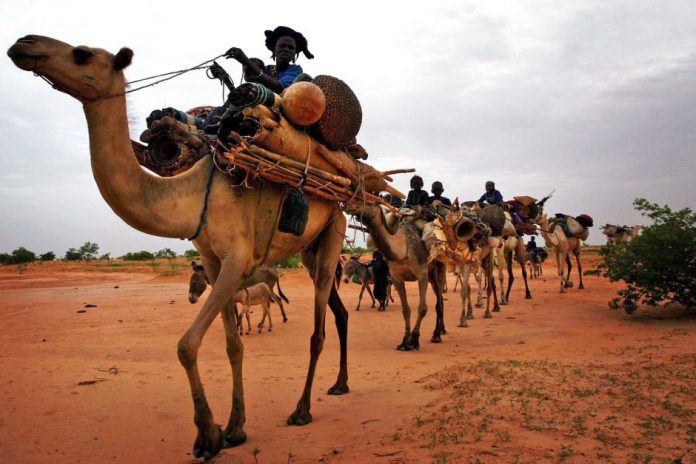Every winter Tuareg groups traverse the Niger’s Tenere desert to get a hold of salt which is available from the Bilma oasis and exchange millet for the dates. Salt is necessary for Sahelian domestic animals as well as it are in short supply also it is a restricted deposit collective with weighty consumption ensuring money-making markets.
In the earlier period, for security, caravans used to form groups and used to travel together. They were attended by a spokesperson of the Agadez Sultanate, who bargained protected passageway as well as single-minded the prices of the salt. Normally more than 20,000 camels participated. This arrangement has lengthy fragmented and also at the present time, contestants includes the friends as well as families who guild together under the leadership of a headman por the chief normally known as ‘madagu’.
Caravans start from the place for the participation during the autumn season. In view of the fact that the Tenere is entirely infertile, camel silage is sliced in advance and packed together into compressed bales. Simply certain diversitie of grass are appropriate, first and foremost ‘grifis’ as well as in the Air massif ‘amassa’. Subsequent to the droughts, the deficiency of this grass will put off caravans from leave-taking. Every camel swallows 2 goatskins as well as 2 fodder bales of bring into being for negotiation in Bilma. Maize, millet as well as beans, also the cheese and the desiccated vegetables are the part of the barter. To take benefit of scratching, the early speed is relaxed. On the attainment of the Tenere’s dunes, on the other hand, caravans stride from morning up to night. These sandbanks are longitudinal in form, in a row on huge parallel edges from south-west to north-east.
The granule of the ground approximately matches up to the caravan’s behavior. This to a certain extent gives details of the success of the salt trade over a number of years, and to a great extent makes navigation possible, predominantly from the time when the Bilma as well as the Fachi escarpments slash crossways the track. At this time in this overwhelming rough country the madagu’s know-how proves very useful. Finding the suitable sandbank channels in the course of which to take a trip is significant, for a number of people there are many dead ends, others enclose soft as well as loose sand. Nightly stops are a marvelous relief subsequent to the case of a little more than 50 km everyday. Camels are hurriedly dropped off and silage bales prearranged hooked on the windbreaks. Tea is without delay prepared chased by a scorching evening meal of boiled millet flavored with the sauce of various herbs.
The out-of-the-way Fachi oasis offers a greeting breathing space. Cuddling up under an escarpment and surrounded by palm orchards, the move toward to Fachi is extremely gorgeous. The additional northerly Tuareg as well as the Kel Air by exceed Fachi, captivating a straight route through the Achegour well. Every time in between the passing weeks lorry plough flanked by Bilma on one side and Fachi on the other, transportation from the region of Agadez is uncommon. The oasis is as a result more related to the caravans other than the Bilma, but Fachi’s salt is considered as the second ranking and the majority of the caravans force down on to the region of Bilma – for additional 4 days.
Bilma is located on the Kaouar’s escarpments south most boundary. It is the provincial managerial centre. The populations, similar to Fachi, are the Kanouri. The salted pits of Kalala are the salt manufacturing district which dates back in the past for minimum one thousand years and are yet crucially essential. In reality, Bilma’s salty production has in fact greater than before, despite the fact that the mass is now elated by various trucks. Weighty brine is discovered here by the excavations of pits up to a depth of 6 to 8 m. These four-sided figure pits are prearranged in grouping with a lowest rock wall blotching every holding’s border. The heavy rainfall that took place in the summer season of the year 2006 flooded and for the short term shattered a number of pits.
Salt withdrawal is on the whole a trouble-free despite the fact that boring course of action. Towering summer season’s temperatures as well as the disappearance reasons the formation of a salt outer layer to fall into place more than the salt water exterior. The outer layer is constantly destroyed, they forcing the remains to go under the surface and also to create the sediment. The sediment’s higher coating capitulate the salt in its purest form, acknowledged correspondingly as ‘egil’ or the ‘beza’ by the Tuareg as well as the Hausa, and ordained for human utilization. The various pillars are known as ‘takiss’ as well as the ‘kantou’ and weigh up 21 kg. Undersized cake fashioned moulds commonly known as ‘fochi’ weigh up 2 kg, and are made up of the similar mix which is used for the manufacture of the pillars. Mutually these outward appearances are from contaminated salt as well as for domestic animals.
The women of Kanouri have a stopover at the caravan sites as to exchange goods as well as to have a little gab. The ratio that is decided for the exchange of the goods remains moderately steady at 3 volumes of dates in exchange of 2 volumes of millet. No more than conflicts as well as the droughts considerably change this steadiness. Trucks also come in to the Kalala as to fill the smaller as well as little delicate ‘fochi’ mould.
There has been a propensity by reporters, and a number of ethnologists, to view through rose-tinted glasses and as also to project the caravans as “doomed by the combustion engine”. This is disingenuous. Factual, the Tuareg do not have control on the distribution as well as the transportation of salt, also the numbers of caravans are declining drastically, however their financial system has continued to exist extraordinarily well, and the turnover margins on salt auctions when evaluated with the millet costs generally in line with 30 years in the past – even captivating into report the CFA depreciation in that was made in the year 1994.
After the purchase of millet and the sell of the salt the Tuareg might look out for transportation or haulage employment such as transporting the goods from one village to the other village. In the earlier period, the transportation of ground nuts was a common employment, but in the present time it is not much profitable as it was before. At present it is the period to purchase gifts for wives as well as families, such as foot wears as well as clothes. After that, in the direction of tardy spring season, just previous to the rains that would take place in the summer season, the caravan walks the way back to their original dwell.




